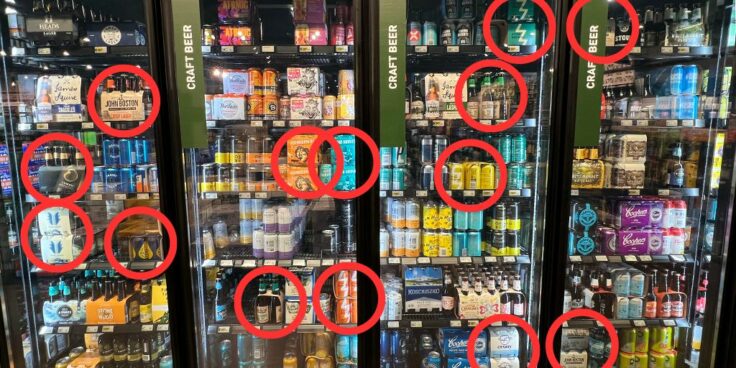
Calls for 'real teeth' in regulating large retailers

Coles Group’s announcement that it will acquire two milk processing facilities has sparked calls for stronger regulation of the major retailers as they move deeper into the supply chain to compete with their suppliers, including brewers.
Coles will pay $105 million for Canadian dairy company Saputo Australia’s facilities in a move that has been described as underlining the “dire state of Australia’s dairy industry”, which can be traced back to the Coles-led milk price war.
The milk industry moves have ominous undertones for the brewing industry as the major retailers increasingly focus on their own private label brands.
The move has prompted calls for tighter regulation of the retailers with Federal National leader David Littleproud calling for ‘regulatory guard rails’ in the form of a compulsory code of conduct to protect suppliers.
“This is something where we need regulatory reform when three of the big supermarkets in this country run 74 per cent of retail, that is market power that needs regulatory guide rails, and it doesn’t have at the moment,” he told Brews News
“I’ve been consistent and long-standing in my criticism of supermarkets. I don’t think they’re good corporate citizens, particularly to small businesses and small suppliers, who are not just farmers but also small businesses go in this,” he said.
The calls come as Coles recently added more than 200 products under its Exclusive Liquor Brands and Endeavour’s Pinnacle Group added more than 479 new products in FY22.
The expansion in private label brands on shelves has increasingly unsettled brewers with many raising concerns with Brews News.
The extent of the retailer’s market power is highlighted by the fact that, while willing to speak out about the tap contracting practices of the two major brewers, small brewers are unwilling to publicly raise any concerns about the practices of the retailers for fear of reprisals.
David Littleproud said this fear underscored the need for Government action.
“This is where government and politicians need to do it for you,” he said. “Because there’s fear that there’s repercussions for standing up to these behemoths.”
“And that’s what a democracy should be. You shouldn’t have to do that. That’s where politicians should do that.
“And I’ve had a long-standing fight with the big two Australian supermarkets and the big German, I broke the dollar leader milk because I stood up to them and told them that we’d bring in a Royal Commission into their conduct.
“Now, we just need the political will and courage to do it.”
He said giving the Code teeth included forced divestiture if the supermarkets didn’t ‘play nice’.
“We think quite clearly that if they if these big supermarkets misuse their power and have been found to do wrong, then we should use divestiture powers as big stick legislation as we did with with energy companies,” he said.
“If these companies lost a couple of their bottle shops or service stations, I’m sure they’ll start to play nice.”
Littleproud said he had been working constructively with the Assistant Minister for Competition Dr Andrew Leigh.
“To his credit, he actually reached out to me to get some of the work that we’d already done as a National Party on this policy that we were moving towards this compulsory grocery code with some real teeth,” he said.
“So I made it clear to the new minister and to the new government that if they were to continue on a reform process, then we would we would work in a bipartisan way to make sure that those regulatory guide rails were fit-for-purpose for a marketplace that is involved in the three big players controlling 74 per cent of the marketplace.”
He said the best solution was not the ACCC.
“We need a cheap, independent arbiter for small businesses and farmers to be able to get their grievances heard, instead of having to use the effects test to prosecute one of the supermarkets.”
He said that the process under the effects test would cost the best part of $10 million dollars.
“And they’ll fight you all the way. And then and then they’ll demonise you and there’ll be repercussions for your actions I suspect on the way through.”
Assistant Minister for Charities, Competition and Treasury Dr Andrew Leigh said that a review of the Grocery Code of Conduct was underway.
“Treasury is in the process of finalising a review of the dispute resolution provisions of the Grocery Code of Conduct,” he said.
“The second phase of that review will include the remaining provisions of the Code and will commence in October of this year.
“This will be an opportunity to evaluate the Code’s effectiveness and assess if further changes are warranted.
“The Government is aware that there have been some calls to make the Code mandatory and include civil penalties. These issues may be revisited in the context of this review.”
Vertical integration is a growing issue in the brewing industry, with competition experts highlighting the risks it poses for competition.



